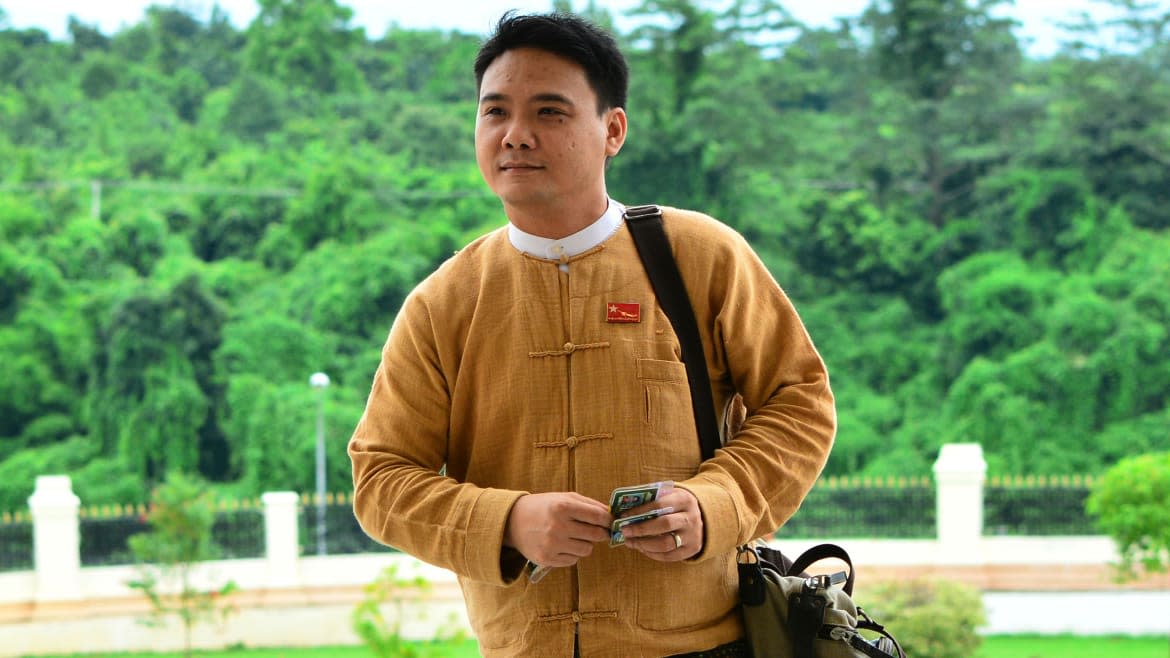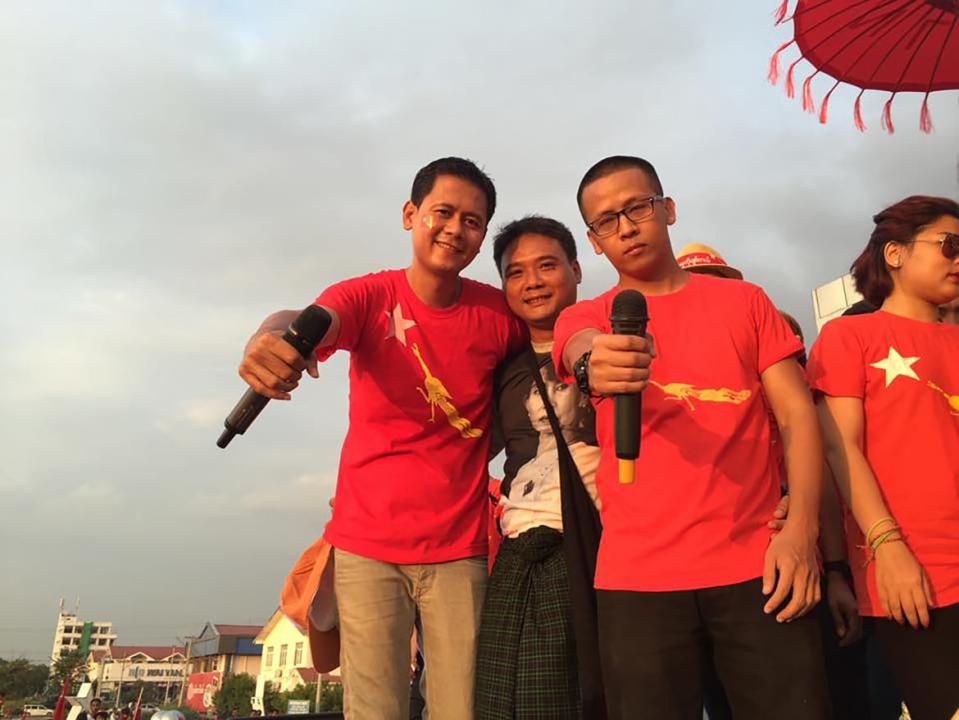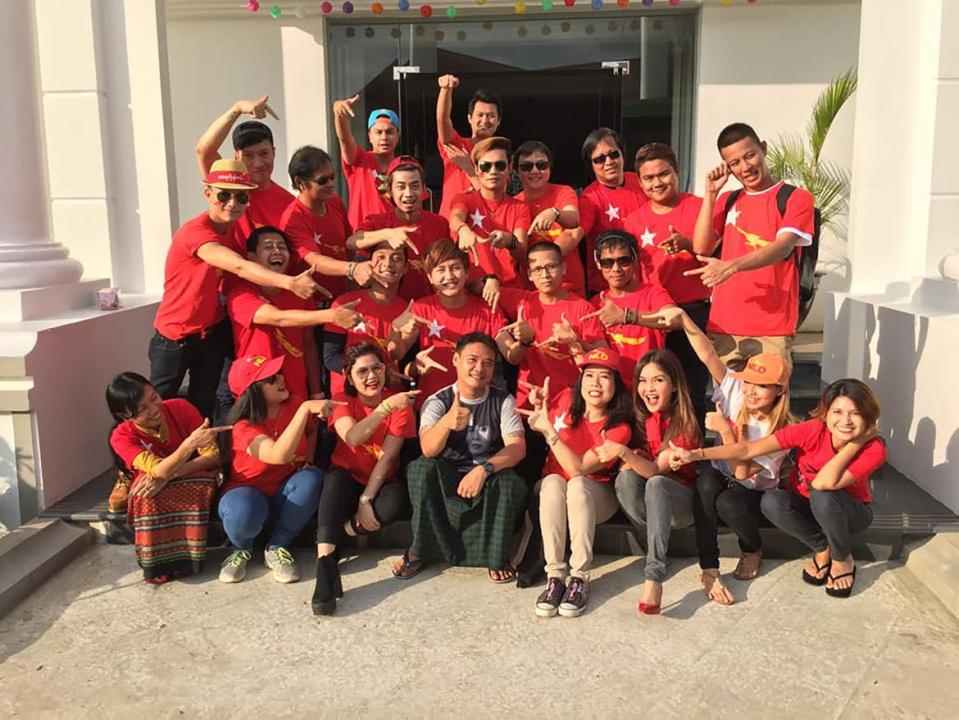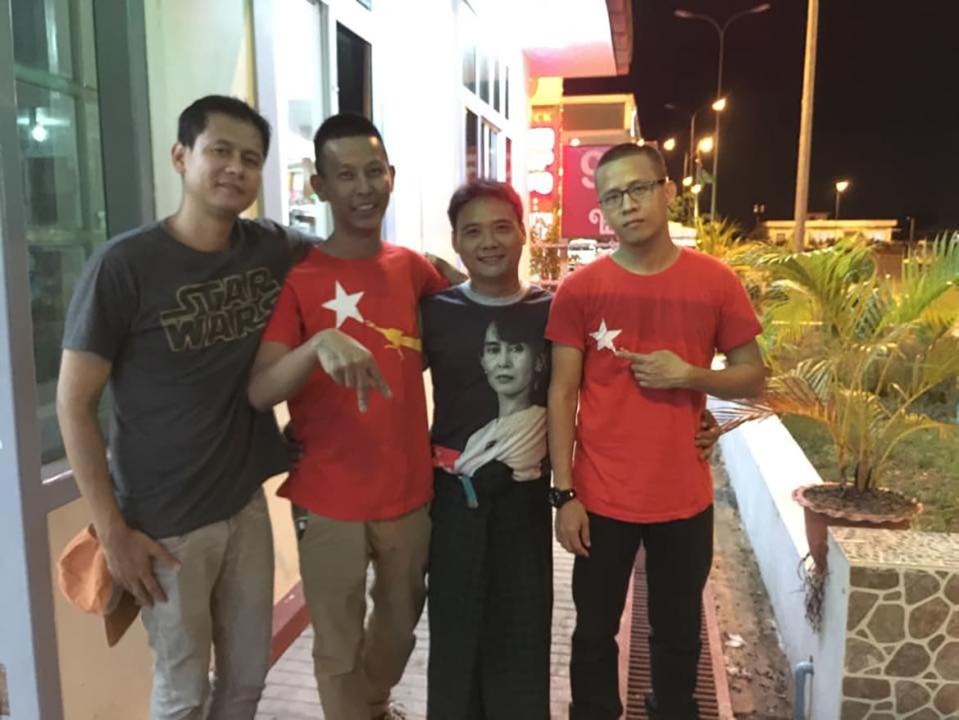Executing This Hip-Hop Star Could Be Rogue State’s Biggest Mistake

- Oops!Something went wrong.Please try again later.
His story has become the stuff of legend.
In mid-November 2021, 400 Myanmar military soldiers went on a mission to arrest one man in Yangon: a hip-hop star named Zeya Thaw.
Over the last 10 years, he’d become a politician and close ally of democracy leader Aung San Suu Kyi, but that was hardly the primary reason for his dramatic arrest. Aside from being one of the foremost pioneers of Myanmar hip-hop, Zeya Thaw was also the head of the armed resistance in Yangon.
The rebel movement has not publicly acknowledged his true role, but four sources with intimate knowledge of the Yangon underground have confirmed to The Daily Beast his position as the top commander in the country’s largest city.
The underground resistance movement formed after the military overthrew the elected government in February 2021, and peaceful protesters realized their options were limited in the face of the military’s increasingly violent attacks and tactics akin to the kind witnessed in genocidal regimes.
The hip-hop star turned parliamentarian—full name, Phyo Zeya Thaw—led strategy and coordinated armed efforts to root out the military regime in Yangon. That is why the junta was so hellbent on bringing him down. He was the military’s top “get,” but he was given the death sentence, tortured, and executed alongside Ko Jimmy, a veteran resistance leader who was in charge of arms procurement for Yangon, and two other men in the movement. And now officials are still refusing to allow their families to collect the bodies for proper burial.
The resistance movement is torn between wanting to publicly honor Zeya Thaw’s heroism and worrying that the turn to violence might offend the sensibilities of international governments, who, so far, have provided no funding or arms support, despite ongoing military attacks on civilians. While the world remains focused on President Putin’s invasion of Ukraine, the Myanmar military’s savage crackdown has largely been forgotten outside the region. And the initially non-violent movement has gone from beseeching the world for help to acknowledging, sadly and cynically, that they are on their own. One member, who was also knowledgeable about Zeya Thaw’s training at a clandestine jungle camp, said: “No apology.” Not only did Zeya Thaw do what anyone should be able to do to defend their right to survive, but that, “He showed us the way.”
His arrest last November was a setback to the underground movement in Yangon and his recent execution a shocking act of political violence, even by the standards of the Myanmar military. But although he is gone, his influence is far from diminished; if anything, despite the junta’s best efforts, it’s grown, and the nationwide resistance movement—fueled largely by Myanmar’s younger generation—is still going strong.
And that is a surprise. Because until the 2021 coup, Zeya Thaw was an outlier—unusual among local hip-hop stars for how explicitly and publicly political he was, but even more so, when compared to the overwhelming majority of Myanmar’s apathetic young generation.

Zeya Thaw campaigning, with the two other (at that time) Acid members still alive, anegga and Yan Yan Chan
I first moved to Myanmar in 2013 to work as a journalist and do academic research; it was shortly after the military opened up the country and embarked on a path of democratization, and I’ve now spent the better part of a decade researching technology, youth culture, politics, and the rise of Myanmar hip-hop. Part of my research has involved investigating how people, especially young people, defined and engaged with politics and the political.
Sitting at a private restaurant booth on a humid fall afternoon in 2013, one millennial couple in Yangon had the kind of reaction I’d come to learn was typical when the topic arose.
“Politics is for politicians,” they said and laughed. “That’s all.” Laughing again, they added: “We don’t know anything about politics. And [we’re] not interested.” And they laughed again.
In 1988, an unprecedented nationwide uprising challenged the military dictatorship’s grip on power. The military crushed it brutally, and in an attempt to wipe out the possibility of future dissent (and, thus, prevent a repeat of the uprising) doubled down on efforts to divorce politics and the political from the lives and consciousness of everyday people.
They did this in two key ways. For starters, for the general public, the military strove to equate politics with anything that challenged their rule—protests, voting, or supporting the pro-democracy party. Participation with (what they defined as) politics was not only forbidden but also highly dangerous and, therefore, something to fear; after all, people who were involved were arrested, tortured, or even killed.
Farcical Trial of Disgraced Aung San Suu Kyi Restores Her Power as the Legend of the Revolution
Political books were also banned, as was any kind of political education. In effect, the military taught a certain level of fear and ignorance so that people would not—out of fear—and could not—out of ignorance—become involved. And to a large extent it worked. A primary reason young people repeatedly gave for why they had no interest in politics or anything political was that they didn’t know anything about it.
There was a small minority who might dip their toes outside those bounds, privately admitting some interest or that they felt there was more to it than the military’s definition and it seemed important. But, nearly always, they would make sure to come back to safe boundaries.
Whether driven by fear, true disinterest, or a potent combination, the military largely succeeded in raising a generation of politically disconnected and apathetic young people (who also knew and cared little about the mistreatment of the country’s various ethnic and religious minorities). And whatever the original motivation, this became the accepted norm, even after elections in 2015, when Aung San Suu Kyi and her democracy party won in a landslide. One member of generation Z with whom I had frequent, blunt conversations, even became viscerally angry at me in 2017; using biting language, he explained that he didn’t care about the political situation or ever want to address it.
So, it was shocking when right after the 2021 coup, like a tidal wave, profile photos across Myanmar Facebook changed to black, then red; black to signify sadness; red to show support for the ousted democracy party. It was like a collective head nod that stemmed the tide of fear.
Then an overwhelming number of people began posting political statements on Facebook, as if the military couldn’t read their very public profiles… or as if they no longer cared. And it was not merely the activists or the ones who harbored beliefs but rarely spoke them aloud; it was nearly everyone, down to the least political.
Posts became increasingly brazen. Activists and politicians would sign theirs, but mostly, someone would come up with a good rallying statement or way to fight, and the post would spread like wildfire— just copied and pasted with the word “credit” or “crd” at the end, meaning “credit to the original writer,” so that they could not be traced. There was no single leader.
My private conversations became uncharacteristically raw, overflowing with feelings about politics, personal histories, and how they were fighting back. Young people began posting photos of themselves defiantly at protests. And if they weren’t taking part directly in the protests, they were there signaling support by handing out water or picking up trash (like the millennial couple quoted above), so that the military couldn’t use destruction of property as an excuse to crack down.
The very same Generation Z kid who once shouted down the idea of ever caring about politics became a fixture at protests, and when increasing military violence drove the movement underground, he became highly integrated in the armed resistance, smuggling weapons across Yangon.
With a single action, it was as if the military had swept away decades of their own painstaking efforts. To millennials who grew up in an isolated Myanmar and to Generation Z, who grew up thinking democracy and open borders were just reality, the fear that they’d lose everything they’d gained, flipped a switch. Whereas before the coup, there was a grudging acquiescence to the military’s continued role in society and politics, afterwards they said: no more.
Young people began sharing books and knowledge about politics and history. I’m in Telegram groups where people share Myanmar translations of everything from French philosopher Albert Camus and Princeton economist Daniel Kahneman to books on local political history or mental health. One group that used to be about dance music would just fact check the news after the coup.

Zeya Thaw on the campaign trail, along with celebrities stumping for NLD during the 2015 election
Young people who knew (and cared) little about it, can and will now explain (in detail) the country’s political history, the military’s strategies of divide and conquer, not to mention the atrocities against ethnic minorities. They share articles from ethnic minority news organizations, and perhaps most shockingly, many have publicly apologized for anti-Rohingya statements and sentiments (something that was common from even educated Myanmar citizens pre-coup). Though young, and incomplete, this new unity and support across ethnic lines is unparalleled in modern Myanmar.
Family of American Journo Detained in Myanmar Shares Nightmare: ‘You Never Imagine’
To be sure, the violence has scared many. And until the executions, a veneer of normalcy was finally returning to Myanmar’s biggest cities.
But under the surface, nothing is the same.
It is unlikely that the military fully grasps the special place Zeya Thaw occupies in the popular imagination. Because even before he was the respected resistance leader of Yangon, he was beloved as a member of Acid—the group that made hip-hop famous in Myanmar in 2000, when their album, The Beginning, exploded in popularity across the country and established hip-hop as a permanent and dominant part of Myanmar pop culture. Acid forced the music industry, country, and military to heed teenage voices and stories, at a time when youth had little clout and speaking about their real lives, worries, parties or… how miserable and sad they were was taboo under the harsh censorship system. But Acid did it.

Covers Acid's album, Sa Tin Chin (The Beginning)
In their most famous song, Acid rapped: “The struggle to be free, they want us to lose.”
Hip-hop was the first revolution Zeya Thaw helped birth in Myanmar. Then came jail-time for supporting political prisoners and protesting the military, followed by a career in parliament (while still occasionally appearing at shows)… and now this.
To young people, especially, he is an icon. And one who felt like the leader Myanmar needed right now, who respected the voices of youths as equals but also had the respect of the old guard, who when people were fleeing Yangon amidst the intensifying crackdown, stayed and showed by example how they could fight and fight effectively in the region.
His years as a political prisoner had helped shape a principled determination, and his kindness was well-known, reflected in the fact that so many people referred to him as a friend. He was a leader who inspired and united and who when the military was searching high and low for him, would walk out onto the street to get some food in broad daylight.
Perhaps it’s no surprise that one young man recently remarked to me that he was, “the new Aung San,” referring to the revered independence leader—and father of Aung San Suu Kyi—who freed Myanmar from colonial rule, united the country, and was later assassinated.

Zeya Thaw on the campaign trail, with three other rappers campaigning for NLD
And executing Zeya Thaw always seemed less likely to dampen the resistance and more likely to pour gasoline all over it—in other words, strategically speaking, counter to the military’s goals. In many ways, though, the entire endeavor—from the coup to the crackdown, has been.
The military just announced a new slate of planned executions, but the resistance is at this moment forming new alliances, re-organizing, and re-energized. People are in mourning, their sensations numbed, but they are also extremely angry.
The very first words one young professional in tech uttered flatly, when I checked in after the executions, were not “Hello” or “I can’t believe he’s gone,” but, “All we need is 70 anti-aircraft missiles.” If only someone would sell to them.
Another mused that he did not know his mind could go to such dark, violent places until he heard the news of the executions.
The resistance faces an uphill battle, but for the first time in history, the modern Myanmar military does, too.
No one can predict who will win. But one legacy of this coup is already assured: the military took a generation of politically disconnected and pointedly apathetic youth and transformed them into the very thing they were trying to avoid and destroy—a generation of educated political activists, organizers and fighters, who for the first time in history, are united across ethnic lines, to topple them, once and for all.
And win or lose this current round, the political awakenings of an entire young generation, not to mention their unprecedented unity, is a genie that the military cannot put back in any bottle.
In other words, the Myanmar military has created its own worst nightmare.
Get the Daily Beast's biggest scoops and scandals delivered right to your inbox. Sign up now.
Stay informed and gain unlimited access to the Daily Beast's unmatched reporting. Subscribe now.

